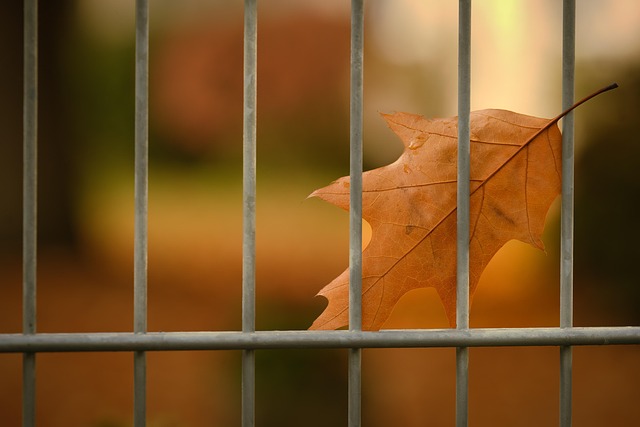In New Bedford, MA, understanding fence warranties is crucial for homeowners and businesses alike to ensure long-lasting protection. This comprehensive article delves into the intricacies of fence guarantees, covering essential aspects from basic warranty types to common exclusions. We explore residential and commercial fence warranties, lifespan expectations, and the claims process. By the end, readers will be equipped with knowledge to make informed decisions and enforce their fence warranties effectively.
- Understanding Fence Warranty Basics in New Bedford
- Types of Guarantees for Residential Fences
- Commercial Fence Warranties Explained
- How Long Do Fences Typically Last?
- Claiming and Enforcing Your Warranty
- Common Exclusions & Limitations in Fence Warranties
Understanding Fence Warranty Basics in New Bedford
In New Bedford, when investing in a new fence, understanding the warranty and guarantees offered is paramount. A fence warranty typically covers defects in materials and craftsmanship for a specified period, protecting your investment from unforeseen issues. These warranties can vary greatly in duration and scope, ranging from one to several years, with some even offering lifetime coverage under certain conditions.
Basic warranties usually cover repairs or replacements for damaged or faulty parts due to manufacturing defects or installation errors. However, it’s crucial to read the fine print as exclusions and limitations often apply. Some manufacturers might exclude damage caused by extreme weather events, neglect, or improper maintenance from their warranty coverage. Being aware of these details ensures you’re protected when needed and avoids potential disputes with the fence provider.
Types of Guarantees for Residential Fences
When it comes to residential fences in New Bedford, MA, understanding the various guarantees and warranties available is essential for homeowners. These assurances protect your investment and ensure the quality of the fence installation or repair work. Generally, there are three main types of guarantees you can expect:
1. Material Warranty: This covers any defects or issues with the fence’s materials, including manufacturer defects or problems related to the quality of the products used. It typically lasts for a specified number of years and may require proof of purchase and proper installation.
2. Labor Guarantee: Homeowners should receive assurance from their contractors that their work will be free from defects due to skilled craftsmanship. This guarantee ensures that any issues arising from improper installation, such as poor post-setting or faulty wiring, will be rectified without additional cost to the homeowner within a defined period.
3. Performance Warranty: This type of warranty focuses on the fence’s overall performance and durability. It guarantees that the fence will remain standing, secure, and free from significant damage for an extended period, often 20 years or more. Such warranties protect against unforeseen issues like rot, pest infestation, or extreme weather events compromising the fence’s integrity.
Commercial Fence Warranties Explained
Commercial fence warranties are designed to protect business owners and ensure high-quality workmanship for their fencing investments. These guarantees vary but typically cover defects in materials or craftsmanship, ensuring that any issues with the fence are addressed promptly. For example, a standard commercial warranty might include coverage for repairs or replacement of damaged sections within a specified period, usually 1-5 years, depending on the manufacturer and local regulations.
Business owners should carefully review the terms and conditions of these warranties to understand what is covered and any exclusions. Some warranties may not apply to certain types of damage, such as those caused by extreme weather events or misuse. Understanding these details ensures that in the event of a problem, the necessary repairs can be made efficiently, maintaining the integrity and aesthetic appeal of the commercial fence.
How Long Do Fences Typically Last?
Fences, depending on their material and quality, can typically last anywhere from 10 to 30 years. Wooden fences, for instance, often need to be replaced after 15-20 years due to rot, pests, and weather damage. Vinyl fences, being more durable, can last up to 40 years or more with minimal maintenance. Steel or iron fences are known to withstand even longer, sometimes reaching 50 years or more, especially in areas where regular painting is conducted to prevent rusting.
The lifespan of a fence also depends on factors such as installation quality, local climate, and the level of care it receives. Regular cleaning, repainting (for metal fences), and treatment against pests can significantly extend the life of any type of fence, ensuring that it not only serves its functional purpose for longer but also retains its aesthetic appeal.
Claiming and Enforcing Your Warranty
When issues arise with your fence, knowing how to claim and enforce your warranty is crucial. The first step is to carefully review the terms and conditions outlined in your contract, ensuring you understand what is covered and any specific procedures for filing a claim. Most warranties require timely reporting of problems, often within a specified period after installation or discovery.
Contacting your fence installer or the manufacturer directly is typically the next step. Clearly communicate the issue and provide all necessary details, including photos or descriptions, to support your claim. They may guide you through the process, request additional information, or even send an inspector to assess the damage. It’s important to keep records of all communications, as well as any guarantees or agreements made during this enforcement process.
Common Exclusions & Limitations in Fence Warranties
When perusing fence warranties in New Bedford, MA, it’s crucial to understand that not all damages are covered. Standard exclusions often include wear and tear, natural disasters, and negligence. For instance, if strong winds or heavy snowfall damage your fence, these might not be covered under a typical warranty. Similarly, intentional acts like throwing objects at the fence or improper maintenance can void your guarantee.
Additionally, warranties usually have limitations on coverage duration, specific areas excluded from protection, and requirements for proof of purchase and installation. Some warranties may not cover labor costs for repairs, while others might only cover specific parts. Always read the fine print to comprehend what’s guaranteed and what’s not.
